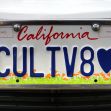The next great civil rights war is underway, and the first battle has been decided: Angrily honking your car’s horn is not protected free speech, according to a federal appeals court in California.
According to Section 27001 of California’s Vehicle Code, the driver of a motor vehicle is allowed to honk their horn only “when reasonably necessary to insure safe operation” by way of an audible warning. Outside of warning someone of imminent danger, or as a theft alarm system, the “horn shall not otherwise be used” in the State of California.
This law may come as a shock to many California drivers who use their car horns as an artful expression of their feelings about the day’s traffic. As any criminal defense lawyer will tell you, however, ignorance of the law is no excuse. Everyone who has honked to express frustration with a traffic jam or even to show support for a particularly enticing bumper sticker has apparently been breaking the law.
One California driver took objection to the law and is now leading a charge to get that particular section of the Vehicle Code tossed out the window. The plaintiff was cited for misuse of her horn in San Diego County after honking in support of protestors gathered outside of a government official’s office. Although her citation was eventually dropped, the American Civil Liberties Union of San Diego & Imperial Counties nevertheless sued the county and the state on her behalf to block enforcement of the law against “expressive horn use,” such as honks to “support candidates or causes” or “greet friends or neighbors, summon children or co-workers, or celebrate weddings or victories.” The text of Section 27001 would appear to outlaw honking in any of these situations.
The plaintiff claims that Section 27001 violates the First and Fourteenth Amendments as a violation of her free-speech rights. The district court granted summary judgment in favor of the State of California, and that judgment was upheld on appeal by a divided panel of the Ninth Circuit Court of Appeals.
According to the Ninth Circuit majority, the law is not a “content-based” restriction, meaning that the law need only pass “intermediate scrutiny.” When applying intermediate scrutiny, the court evaluates whether a law furthers an important government interest without unduly restricting First Amendment freedoms.
The court found that, although honking a horn can certainly be used to communicate in a manner protected by the First Amendment, the law is sufficiently tailored to serve the important governmental interest of traffic safety. Honking in any other circumstance besides traffic safety “dilutes the horn’s usefulness as a safety device and creates dangers of its own.” The court could find “no plausible means by which California could permit non-distracting honks while prohibiting distracting honks.” Drivers also have many other options for self-expression. Because the law is narrowly tailored to the State’s need for traffic safety, the appeals court upheld judgment for the State.
The Ninth Circuit panel was, however, divided 2-1. The dissenting judge argued that Section 27001 is unconstitutional insofar as it prohibits “core expressive conduct.” Supporting a political protest is fundamental to free expression under the Constitution, and the law should not be utilized to prevent such protected expression. The statute could be more narrowly tailored to exclude such expressive conduct. Because it is not so tailored, the dissent argued the court should issue an injunction against enforcement of the law, at least as applied to “political protest honking.”
Emboldened by the dissent, the plaintiff--and her civil rights legal team--could seek a rehearing by a larger panel of the Ninth Circuit.






